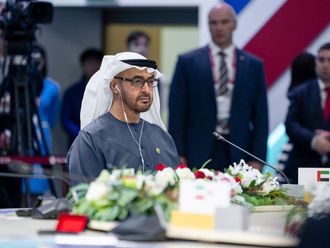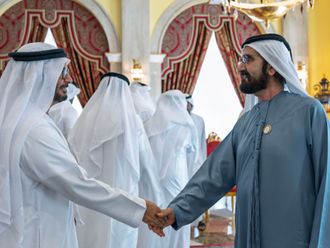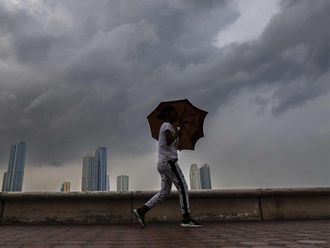The leadership of a militant Islamic group led by Saudi dissident Osama bin Laden ordered its fighters to attack U.S. bases and not to worry about civilian deaths, a member of the group testified yesterday. Jamal Ahmed Alfadl, the first witness in a trial against four bin Laden followers charged in the August 1998 bombings of two U.S. embassies in Africa, testified about the al Qaeda (the Base) group's hierarchy, his work with bin Laden, and a series of fatwahs or religious decrees received by al Qaeda members.
At one meeting the al Qaeda leadership said the killing of civilians was allowed if they were near attacks on U.S. military bases, Alfadl testified. The trial is based on a long indictment against bin Laden and a group of his associates accusing them in schemes that began in 1989 and included the bombings of U.S. embassies in Tanzania and Kenya which caused extensive civilian casualties.
Prosecutors allege that bin Laden masterminded the twin blasts that killed 224 people, including 12 Americans, and injured thousands. The indictment also charges the defendants with conspiring to kill members of the U.S. military stationed in Saudi Arabia and Somalia. The indictment focuses on the alleged activities of al Qaeda, described by prosecutors as an "international terrorist group" run by bin Laden. The group is "dedicated to opposing non-Islamic governments with force and violence" with a goal of driving U.S. armed forces out of Saudi Arabia and Somalia.
The indictment charges that bin Laden endorsed a fatwah, or religious decree, stating Muslims should kill Americans - including civilians - anywhere in the world. Those on trial for conspiring with bin Laden are Wadih El-Hage, 40, a naturalized U.S. citizen born in Lebanon; Mohammed Rashed Daoud Al 'Owhali, 24, a Saudi Arabian; Khalfan Khamis Mohamed, 27, a Tanzanian, and Mohamed Sadeek Odeh, 35, a Jordanian. Mohamed and al-'Owhali could face the death penalty if convicted.
During yesterday's testimony Alfadl said he had been among the first members of al Qaeda, which bin Laden formed as part of Muslim efforts to fight the Soviet invasion of Afghanistan. Alfadl said he later helped move al Qaeda's operations to the Sudan where he worked at the organization's offices with bin Laden. He said that beginning in 1991, at the time of the Gulf war, he had been at meetings of al Qaeda members where they learned of various fatwahs against Americans.
Alfadl said bin Laden along with other leaders issued a fatwah at that time. "It said we can't let Americans stay in the holy area ... we have to do something to take them out ... to fight them." He said the group's leadership issued later orders about attacking the U.S. military including one in late 1992 or early 1993 due to growing concern about U.S. forces in Somalia. "If they succeed in Somalia, they'll be in the Sudan ... They want to take over all the countries," Alfadl said quoting talk at an al Qaeda meeting.
He said the leadership at a later meeting said the loss of civilians was permitted if they were near attacks on the U.S. military. Among those at the meeting was Mamdouh Mahmud Salim, a high-level adviser to bin Laden. Salim, who was indicted with the other defendants, was severed from the trial after he allegedly attacked a prison guard on Nov. 1, driving a sharpened comb through his eye and into his brain. He will be facing separate attempted murder charges at a later date.
Alfadl said Salim interpreted the fatwah to mean if Muslims plan to bomb a U.S. military building and civilians are nearby "you don't have a choice ... you should do it and don't have to worry about that." Bin Laden, who is in Afghanistan, is among 13 defendants who are fugitives and the U.S. government is offering rewards of $5 million for information leading to their arrest.
Three other defendants are in extradition proceedings in Britain. Earlier Tuesday, Afghanistan's ruling Taliban movement said it would continue to give sanctuary to bin Laden. Abdul Salam Zaeef, the Taliban ambassador to Pakistan, dismissed a report in the London Times Monday that the Taliban might hand over bin Laden in exchange for recognition as the government of Afghanistan.












